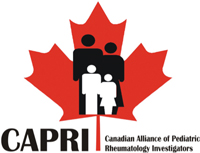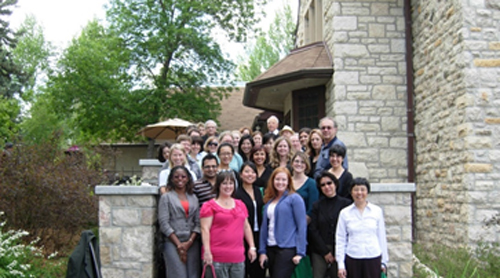Fall 2016 (Volume 26, Number 3)
Pediatric Rheumatology Research in Canada
The Canadian Alliance of Pediatric Rheumatology Investigators: CAPRI is Growing Up
Lori B. Tucker, MD, FRCPC, Chair, CAPRI
Download PDF

Canadian pediatric rheumatology research has earned attention and respect nationally and internationally, largely due to pediatric rheumatology clinicians and investigators from all across Canada coming together to form a national research network: the Canadian Alliance of Pediatric Rheumatology Investigators (CAPRI). As a group, we had worked together for many years on issues related to training, education and advocacy. A need for a group to represent and facilitate collaborative research across all Canadian pediatric rheumatology centres was identified in 2006 at a seminal meeting held in Vancouver, BC. We recognized that research in childhood rheumatic disease could only be effectively conducted in a multicentre manner, and decided to start a network. The group decided to focus on childhood arthritis, and out of that meeting, a New Emerging Team grant was submitted to CIHR and was successful. This was the birth of the Research on Arthritis in Canadian Children Emphasizing Outcomes (ReACCh-Out) study and the CAPRI group.
The mission of CAPRI is “pursuit of new knowledge for the benefit of children and adolescents with rheumatic diseases,” with objectives to: 1) facilitate research on childhood rheumatic diseases through collaborative multicentre studies involving pediatric rheumatology centres in Canada; 2) build an infrastructure for multicentre pediatric rheumatology research; 3) facilitate and foster pediatric rheumatology research in which single or a few centres participate; 4) facilitate research training for those interested in a career in pediatric rheumatology research and to foster research careers of new investigators; and 5) liaise with other research groups both nationally and internationally.
Since the inception of the ReACCh-Out study, CAPRI has grown in research scope and membership. Our network includes as members all pediatric rheumatologists from every pediatric rheumatology centre in Canada, and has expanded to include research members who are not pediatric rheumatologists but engaged in pediatric rheumatology research, and trainees. Our initial project, ReACCh-Out, has been a terrific success with 1,500 children with newly diagnosed juvenile idiopathic arthritis (JIA) enrolled from all across Canada. We have creatively utilized the enormous resources from the ReACCh-Out cohort to study predictors of disease course, risk of flares, uveitis, pain, health-related quality of life, and novel genomic/biologic disease clustering. Our research in JIA has continued on from ReACCh-Out, to include studies on biologic basis of disease (Biologically Based Outcome Predictors in JIA [BBOP]; Principal Investigator [PI] Alan Rosenberg), and physical activity in children with JIA (Linking Exercise Activity and Pathophysiology in Canadian Children with JIA [LEAP]; PIs Lori Tucker and Ciaran Duffy). Several CAPRI members are international experts in childhood vasculitis research, and lead major research initiatives which involve CAPRI. These include A Registry of Childhood Vasculitis: E-entry (ArCHIVe) and the Pediatric Vasculitis Initiative (PedVas) (PI for both, David Cabral), and Brainworks (PI Susanne Benseler). Our next large project in develoment is launching a Canadian National JIA Registry, which will allow longitudinal data collection on children and youth with JIA across Canada, and will be able to be linked to new projects as they come along. The JIA Registry has received start-up funding from The Arthritis Society, and is in a pilot testing phase with full implementation planned for late fall 2016.
The enthusiasm and growth of CAPRI could be best seen at our most recent scientific meeting, which took place in Toronto on April 12-13, 2016. Forty-five members from across the country attended the meeting, and there were sessions reviewing current research, workgroup sessions for established projects as well as emerging programs such as transition research, outside speakers and work sessions on employing knowledge-translation strategies using our research results, and discussion of future directions and goals. Evaluations of the meeting from attendees were very positive, and the excitement and engagement of participants was fantastic.
As a small pediatric research network, CAPRI is doing well with steady growth, while remaining open to new opportunities and driven by our members’ interests. CAPRI is a member of the Mother, Infant, Child, and Youth Research Network (MICYRN), a coordination body of Canadian pediatric research networks, and this connection is providing opportunities for infrastructure development. We have good collaboration with U.S. and international pediatric rheumatology researchers and research groups, and we have now become an important voice of Canadian pediatric rheumatology research in a variety of settings. Most importantly, we are a collaborative bunch who recognize the value of working together, and enjoy it. We are fortunate to have within our CAPRI membership tremendous experience, wisdom, creativity and enthusiasm for research. Our most precious asset is our collegiality and ability to work together for common goals, and with that, the future of CAPRI is very bright.

CAPRI members in Saskatoon.
Lori B. Tucker, MD, FRCPC, Chair, CAPRI
Clinical Investigator, Child & Family Research Institute (CFRI)
Clinical Professor, Division of Rheumatology,
Department of Pediatrics, University of British Columbia
Vancouver, British Columbia |